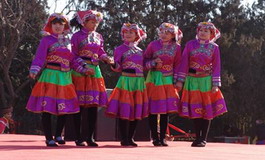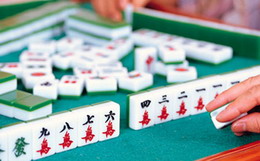
A personal story about Chinese culture
October 1978, a family of five sit in silence as the father drives towards their destination.
In truth I am not sure if it was total silence. My brothers and I were at the difficult teenage age where silence was preferred to useless rattle, useless to us that is. We arrived at our destination, the Chinese Embassy at Ta’ Giorni, Malta. The Ambassador and his wife came out to greet us. If I am not mistaken it was his Excellency Cheng Zhiping around the year 1978. My father introduced us and we were then escorted to a lovely dining room where our first real experience of genuine Chinese food, at its best, began.
It was the first time I had seen a large, round table that had the centre piece turning round. Everything was impeccable and the glasses shining crystal clear. Mindful of the Chinese Ambassador, western cutlery was provided. I had never really seen a chop stick let alone held one. My father’s eyes were sparkling. He could and did appreciate good food. I cannot really recall the different types of dishes we had, and there were many. However one dish that has remained a favourite was the sweet and sour pork.
Beijing, July 2011. I no longer need cutlery. I can manage to eat my sweet and sour pork with chop sticks. Cynthia, my travel companion, and I had already been in Beijing for two days. The next morning we were to fly to Urumqi, capital of Xinjiang Uyghur Autonomous Region. Urumqi is the largest city in Western China. We were to spend four days here, possibly more. From Urumqi, we flew to Kasghar and were met by Nor, our guide.
We were not quite sure what to find in Xinjiang. This part of China has its borders with Tajikistan, Kyrgyzstan and Pakistan. It is home to a number of ethnic groups such as the Uyghur, Han, Kazakh and thus has a diverse and rich culture. The Xinjiang people use their own time system, even though the official time is set to Beijing time. Night life is varied and not at all what one would expect. Barbequed mutton, fresh bread, fruit vendors, kebabs, veiled women on motor bikes, old men on even older donkeys, drawn carts are not quite the typical Chinese scene we envisaged. One could be forgiven in thinking that we were in a Muslim country, since only the road signs were in Chinese. After the heat and dust, the traditional, refreshing melon drink always awaited us at the hotel.
Short for time, and with a very tight agenda, Nor took us to the animal market on Sunday. It was actually an animal lover’s nightmare but a good place to strike a bargain on sheep or cows. We stopped to visit local markets where we saw the medicine man selling potion made up of snake venom, lizard or what have you. Bronze pottery work, carpet making, silver ware, spices are all items that can be found in these markets.
We needed a whole day to travel to Karakul Lake. It had rained heavily and actually driving through the pathways meant driving through swollen lakes and muddy waters. However it was well worth the visit since the view from the lake of the mountains is spectacular and so, so peaceful. It was cold but this was to be expected since some of the mountains were covered with ice.
This part of China is exciting. You can feel a sense of bottled up energy waiting to explode. However, our energy also needed to be replenished and we felt the need to get the feel of the real China, food and all. In Beijing we had a taste of Chinese food and we missed it. Now it was time to say good bye to barbequed mutton and depart for Chengdu, the city of Pandas.
We arrived late at night in Chengdu, capital of Sichuan province. The people are happy, and at peace with themselves. The city is clean, safe to walk about and has a cosmopolitan air about it. We seemed to be the only foreigners and yet we felt safe. The sense of calm seemed to have its effect on us. We somehow fell in love with this city. Just seeing the elders doing their exercise, or watching them play weiqi, was enough to calm us. The food here is spicy, hot and very good. On one occasion as we were crossing a busy lane, we met this wonderful mother with her daughter on their bike. Their English was lovely and we were impressed at the way the young girl expressed herself in perfect English. This is a photo of them. Maybe this article will help me trace this lovely family.
A visit to the People’s park gave us an insight on how the local people spend their free time. They dance, sing and practice taichi. One cannot forget to mention the many tea houses where the locals sip their tea and play majong, weiqi and chess. There is a great sense of peace and freedom here. The Wenshu Temple is dedicated to the Buddhist representation of Wisdom and is surrounded by scented gardens outside and burning incense inside.
On the advice of the ‘great internet’ we set out early one morning to Panda Land. What a beautiful experience to see such cuddly, adorable creatures. We were lucky or wise, since around 10am the pandas tend to doze off and become totally inactive. Since we arrived early we saw them wake up, play, have a shower, eat and the doze off. What a great experience.
Much to our dismay it was time to move on. Our next port of call would be Guilin. I never dreamt that China could offer such diversity or beauty and embrace so many different cultures. Xinjiang and Guilin are so different, opposites almost. Xinjiang has an air of adventure and wilderness whereas Guilin embraces you with her tranquillity and serenity.
December 2011 finds me sitting in the Garden of Serenity at St. Lucia, Malta, built in 1977 by the Chinese Government. One cannot but help feel the silence, tranquillity and beauty of this garden. The plaque on the wall said that the garden symbolises yin and yang, or in a nutshell, perfect balance. Chinese philosophy of life stems from this concept of Yin and Yang. As I listened to the fountains and waterfalls I thought of China and it struck me that these gardens symbolised the Chinese and their tranquil, soul searching way of life. The one visit was not enough. We will have to return again and again to experience each province in order to really understand China and the Chinese philosophical way of life.
By Valerie Chetcuti, Malta
 |
 |


